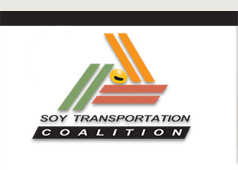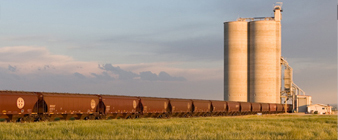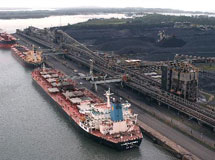 |
 |
|
| eNews • July 2012 | ||
| Promoting a Cost-Effective, Reliable and Competitive Transportation System |
||
 Report: Northwest Export Coal Boom Could Raise Intermodal Rates
Report: Northwest Export Coal Boom Could Raise Intermodal Rates
Bold plans to boost coal export to Asia through Northwest ports will likely slow intermodal and grain shipments, resulting in higher freight rates and equipment costs, according to a new study commissioned by a conservation group.
Proposed port terminals in Washington and Oregon that would help support rail shipments of roughly 75 million tons of coal by 2017 and 170 million tons by 2022 face fierce criticism from environmentalists. They argue the creation of harmful emissions through the burning of coal would simply be shifted elsewhere, as tighter U.S. federal regulation and cheaper natural gas push utilities to burn less of the major fuel source.
Proposals to build export terminals at Cherry Point and Longview, Wash., and St. Helen’s and Port of Morrow, Ore., come as U.S. railroad coal volume is down 10.7 percent so far this year compared to 2011. Export coal shipments to Asia and Europe have helped offset the weakness in the railroads' top business commodity.
The Western Organization of Resource Councils study, conducted by transportation experts Terry Whiteside and G.W. Fauth, warns the flood of export coal shipments could worsen choke points, particularly those in Wyoming, Montana and Washington. State and local transportation agencies would be on the hook for the majority of the billions of dollars in investment needed to handle the increased traffic, the report stated.
“Existing rail traffic, such as export grain traffic and import and export intermodal container traffic, will likely experience a deterioration of rail service, such as higher transit and cycle times, and will likely incur higher costs in the form of higher freight rates and equipment costs,” according to the report.
BNSF Railway will likely be able to provide lower rates for export coal shipments and capture the majority of volume, because the railroad’s routes are “significantly shorter” than the connections of rival Union Pacific Railroad. The authors suggest inviting the Surface Transportation Board, the railroad regulatory agency, to conduct an environmental review of the impacts of export coal via Northwest ports. The introduction of legislation that would require STB approval for volume increases and major capacity improvements is another potential approach.
Source: Journal of Commerce
Soy Transportation Coalition |
|
